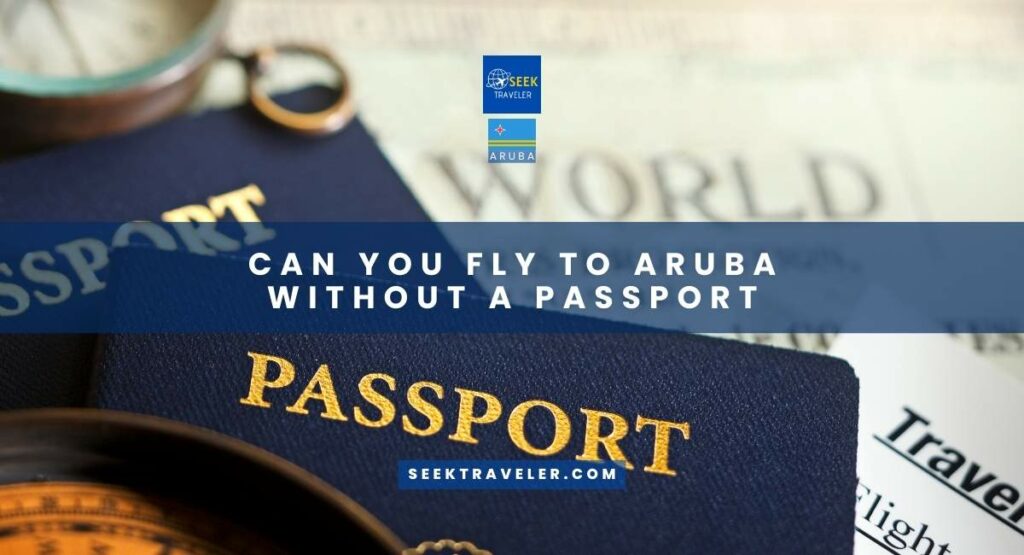Are you dreaming of a tropical getaway to the stunning island of Aruba? The thought of soaking up the sun, sipping on cocktails by the crystal-clear waters, and experiencing all that this paradise has to offer is enough to make anyone’s heart race with excitement. But before you start packing your bags, there’s one important question you need to ask yourself: can you fly to Aruba without a passport?
As they say, every rose has its thorn. In this case, the thorn is an essential document that’s required for international travel: your passport. However, there may be good news for US citizens looking for a hassle-free vacation as flying to Aruba without a passport may be possible!
If you’re wondering how it works and what factors you need to consider before booking your trip, keep reading! We’ve got all the information you need to know about traveling without a passport and enjoying everything this Caribbean gem has in store for you.
Overview of Passport Requirements for International Travel
Before embarking on international travel, it’s essential to understand the passport requirements for your destination country. Passport requirements are set by each individual country and can vary greatly depending on where you’re traveling. In general, though, most countries require a valid passport for entry.
When planning your international travels, make sure to check the passport requirements for your destination well in advance of your trip. Some countries may require that your passport be valid for at least six months beyond the date of entry, while others may have different validity requirements. Additionally, some countries may require a visa or other travel documents in addition to a valid passport. Understanding these requirements ahead of time can help ensure that you’re able to enter and exit the country smoothly and without any issues.
With that said, one question many travelers ask is whether they can fly to Aruba without a passport. The answer is yes – sort of! While US citizens technically do need a passport to enter Aruba (which is part of the Kingdom of the Netherlands), there are certain circumstances under which they can enter using only a government-issued ID card such as a driver’s license or birth certificate.
However, it’s worth noting that this option is only available if you’re traveling directly from the United States and returning within 30 days – so if you plan on staying longer than that or making any stops along the way (even just layovers), you’ll need to have a valid US passport with at least six months’ validity remaining.
Why US Citizens Can Fly to Aruba Without a Passport
Discover how easy it is for US citizens to travel to Aruba with just a valid government-issued ID. As an American traveler, you may wonder why you don’t need a passport to fly to this Caribbean island. Here are some reasons for exemption that will make your trip planning even more stress-free:
- The US and Aruba have a special relationship as former territories of the Kingdom of the Netherlands.
- Aruba is part of the Dutch Caribbean and follows European Union regulations on border control.
- The island relies heavily on tourism and has made it easier for Americans to visit without additional barriers.
- Other countries with similar policies include Canada, Mexico, and some Caribbean nations.
With these factors in mind, you can pack your bags without worrying about applying for a passport or renewing an expired one. However, before booking your trip, there are still important factors to consider such as flight availability and COVID-19 protocols in both the US and Aruba.
Important Factors to Consider Before Booking Your Trip
It’s essential to take into account flight availability and COVID-19 protocols when planning a trip to Aruba, ensuring a smooth and safe travel experience. Check with your preferred airline for flight schedules and restrictions, as some routes may not be operating at full capacity due to the pandemic.
Additionally, familiarize yourself with Aruba’s health protocols before booking your trip. The country requires all visitors to present a negative COVID-19 test result taken within 72 hours of departure or undergo testing upon arrival.
When budgeting for your trip, consider purchasing travel insurance that covers unexpected cancellations or medical emergencies. This will provide peace of mind knowing that you’re protected in case anything goes wrong. Make sure to also factor in incidental expenses such as transportation, meals, and activities when creating your budget plan.
With these factors considered, you can now proceed with confidence in planning an enjoyable vacation in Aruba.
Before packing your bags though, it’s important to know how to obtain the required identification for travel to Aruba without a passport.
How to Obtain the Required Identification
To make sure you have the proper identification needed for travel to Aruba, it’s important to follow these steps. First, consider obtaining a passport if you don’t already have one. This is the most commonly accepted form of identification for international travel and will ensure that you won’t run into any potential roadblocks during your trip.
If getting a passport isn’t an option or you need to travel last minute, there are alternative identification options available. For example, a Trusted Traveler Program (TTP) card from U.S. Customs and Border Protection can be used as a valid form of identification when entering and exiting Aruba by air. Another option is an Enhanced Driver’s License (EDL), which is available in select states and allows for land or sea border crossings between the U.S., Canada, and Mexico.
It’s important to note that these alternative options may not be accepted at all entry points or by all airlines, so double-check before booking your trip. With the right preparation, you can still enjoy your vacation in Aruba without having to worry about missing out on anything due to lack of proper identification.
As mentioned earlier, there are ways to travel without a passport if necessary. However, it’s always recommended to have one as it provides the most hassle-free experience when traveling internationally.
In the next section, we’ll discuss some tips for those who choose to travel without a passport but still want to ensure they have all their bases covered during their trip.
Tips for Traveling Without a Passport
If your travel plans are taking you beyond the borders of your comfort zone, don’t let a missing document clip your wings; here are some nifty tips for globetrotting sans passport.
Firstly, consider alternative options such as a government-issued identification card or an enhanced driver’s license. These documents provide proof of identity and citizenship and can be used for travel within certain countries, including Aruba.
However, it’s important to note that these alternative options have potential limitations. Some countries may not accept them as valid forms of identification for entry or exit, so it’s crucial to research the specific requirements before embarking on your journey.
Additionally, even if these documents are accepted in Aruba, you may face longer wait times at immigration and customs checkpoints compared to those with passports. With this in mind, plan ahead and give yourself ample time for any potential delays upon arrival.
As you prepare to fly without a passport to Aruba using alternative means of identification, keep in mind what to expect when you arrive in Aruba without writing ‘step’.
What to Expect When You Arrive in Aruba
Now that you’ve learned some tips for traveling without a passport, let’s talk about what to expect when you arrive in Aruba.
First things first, you’ll need to go through Aruba’s entry process, which includes presenting a negative COVID-19 test result taken within 72 hours before your departure. Make sure to check the specific requirements and guidelines on Aruba’s official tourism website before your trip.
Once you have cleared the entry process, you can start enjoying your vacation in Aruba! However, it’s important to note that the island has implemented COVID-19 protocols that visitors must follow during their stay. These include wearing face masks in public places and practicing social distancing.
Here are five things to keep in mind while visiting Aruba:
- Respect local rules and regulations regarding COVID-19.
- Bring plenty of sunscreen and drink lots of water to stay hydrated in the tropical climate.
- Take advantage of the many outdoor activities available on the island, such as snorkeling or hiking.
- Don’t miss out on experiencing some of the local cuisine and culture by trying traditional dishes or visiting museums and landmarks.
- Finally, take time to relax and soak up all that this beautiful island has to offer.
As you plan your itinerary for your stay in Aruba, consider adding these top things to do on your list…
Top Things to Do in Aruba
So you’ve arrived in Aruba and now you’re wondering what activities the island has to offer. Well, you’re in luck because Aruba is known for its stunning beaches and abundance of water activities such as snorkeling, scuba diving, and jet skiing.
If you’re interested in learning about the island’s rich history and culture, there are plenty of cultural and historical sites to visit like the Bon Bini Festival or the Archaeological Museum.
And when the sun goes down, don’t miss out on Aruba’s vibrant nightlife scene with live music, casinos, bars and clubs to keep you entertained all night long.
Beaches and Water Activities
Get ready to soak up the sun and make a splash in Aruba’s crystal-clear waters! With over 20 stunning beaches to choose from, there’s something for everyone.
Whether you want to relax on a quiet stretch of sand or try out some adrenaline-pumping water sports, Aruba has it all.
Here are just a few of the top activities you can enjoy at Aruba’s beautiful beaches:
- Snorkeling: Get up close and personal with colorful fish and coral reefs.
- Jet skiing: Feel the wind in your hair as you speed across the waves.
- Stand-up paddleboarding: Explore the coastline at your own pace.
- Parasailing: Soar above the sea and take in breathtaking views.
As always, make sure to practice beach safety and only use water sports equipment that’s certified by professionals.
After you’ve had your fill of fun in the sun, it’s time to explore some of Aruba’s cultural and historical sites.
Cultural and Historical Sites
Take a step back in time and immerse yourself in Aruba’s rich culture by exploring the fascinating historical sites that tell the island’s story.
You can start your journey at Fort Zoutman, the oldest building on the island, which was built in 1798 to protect against pirates. The fort now houses the Aruba Historical Museum where you can learn about Aruba’s indigenous people, colonial era, and modern times.
Aruba’s architectural landmarks are not to be missed either. Visit Alto Vista Chapel, a bright yellow church perched on a hilltop that offers stunning views of the island. This chapel is significant as it marks the spot where Catholicism was introduced to Aruba over 250 years ago.
The California Lighthouse is another must-visit landmark that stands tall and proud at the northern tip of Aruba. It was named after a ship called ‘California’ that wrecked nearby in 1891 and today serves as a popular tourist attraction with breathtaking views of both land and sea.
All these cultural sites help to accentuate the cultural significance of Aruba’s natural attractions.
As you wrap up your day exploring cultural sites, brace yourself for an exciting night ahead with endless options for nightlife and entertainment!
Nightlife and Entertainment
Now that you’ve explored the cultural and historical sites of Aruba, it’s time to experience the vibrant nightlife and entertainment scene. Aruba is known for its top clubs and bars, where locals and tourists alike come together to dance the night away.
One of the most popular spots is Gusto Nightclub, located in Palm Beach. This trendy venue features live DJs, VIP lounges, and a spacious dance floor.
Another must-visit spot is The Sopranos Piano Bar in Oranjestad. This cozy establishment offers live music every night with talented local performers showcasing their skills on stage.
Aruba’s local music scene is also worth exploring. From salsa to reggae, you can find a variety of musical genres being played at bars and restaurants across the island. Whether you’re looking for a laid-back atmosphere or an energetic party vibe, Aruba has something for everyone when it comes to nightlife.
As you plan your trip to Aruba, keep these exciting options in mind for your nights out on the town. But before hitting up the clubs and bars, let’s take a look at some great places to stay during your visit!
Where to Stay in Aruba
If you’re looking for a place to unwind and relax while in Aruba, there are plenty of accommodation options available. Whether you’re looking for the best resorts or budget options, there is something for everyone on this beautiful island.
For those seeking luxury, the Ritz-Carlton and Hyatt Regency offer top-notch amenities such as private beaches, world-class spas, and fine dining restaurants. If you’re on a tighter budget, consider booking a stay at an Airbnb or one of the many affordable hotels dotted around the island.
No matter where you choose to stay in Aruba, you’ll be greeted with stunning views of crystal-clear waters and pristine white sand beaches. From beachside villas to high-rise hotels overlooking the Caribbean Sea, there’s no shortage of accommodation options that cater to every traveler’s needs.
With so much to see and do, it’s easy to understand why Aruba has become such a popular destination for tourists from all over the world. So why not start planning your trip today?
Conclusion: Is Flying to Aruba Without a Passport Right for You?
Ready to explore a tropical paradise where crystal-clear waters and pristine beaches await? Discover if flying to Aruba without a passport is the right choice for your next getaway.
While it may seem enticing to skip the hassle of obtaining a passport, there are both pros and cons to consider before making this decision.
On one hand, traveling without a passport can save time and money. You won’t have to pay for expedited processing or worry about your passport arriving in time for your trip. Additionally, you can avoid the stress of potentially being denied entry due to issues with your passport.
However, it’s important to note that flying without a passport means limiting yourself solely to Aruba and not being able to make any side trips outside of the country. If you prefer more flexibility in your travel plans, an alternative option would be investing in a passport now so that you have it for future vacations.
Ultimately, weigh the pros and cons carefully before deciding whether or not flying without a passport is right for you.
Frequently Asked Questions
Can I travel to Aruba without a passport if I am not a US citizen?
Looking to travel to Aruba but not sure about the travel restrictions and immigration policies? As a non-US citizen, you’ll need a valid passport to enter Aruba. There may be exceptions for those with certain visas or residency permits. However, it’s best to consult with your embassy or consulate before planning your trip.
But don’t let this discourage you from exploring one of the most beautiful Caribbean islands! Aruba offers stunning beaches, rich culture, and friendly locals. It’s a must-visit destination for anyone seeking adventure and relaxation. So book your flight, pack your bags, and get ready for an unforgettable trip full of freedom and fun!
What other forms of identification are accepted for travel to Aruba?
If you’re planning to travel to Aruba, it’s important to know that a valid passport is the main form of identification accepted. However, there are other accepted IDs that may be used in certain circumstances.
For example, US citizens can use a passport card instead of a traditional passport for land or sea travel. Additionally, some airlines may accept government-issued photo IDs such as driver’s licenses or military IDs for domestic flights within the US.
It’s important to note that there may be travel restrictions in place due to COVID-19, so it’s always best to check with your airline and the Aruban government before traveling.
Overall, while a passport is the recommended form of identification for traveling to Aruba, there are alternative options available depending on your specific circumstances.
Are there any additional fees or requirements for traveling without a passport?
Ready for an adventure? Traveling without a passport is possible, but it comes with a few restrictions and fees.
Before you pack your bags, keep in mind that some countries require a passport for entry, so make sure to research the destination beforehand. Additionally, if you plan on crossing international borders during your trip, you’ll need to have alternate forms of identification handy.
While traveling without a passport can be exciting and liberating, it’s important to be prepared for any additional requirements or fees that may come up along the way. So go ahead and explore new horizons – just make sure you have all the necessary documents and information before taking off!
Can I use a passport card instead of a traditional passport for travel to Aruba?
If you’re considering using a passport card for travel to Aruba, it’s important to know its limitations compared to a traditional passport.
While the card is a convenient option for land and sea travel within North America, it cannot be used for international air travel outside of the region.
Additionally, unlike a traditional passport which is valid for 10 years, the passport card is only valid for 5 years and cannot be used for certain types of international travel or as an identification document.
So if you’re planning on flying to Aruba or traveling internationally outside of North America, you’ll need a traditional passport instead of just relying on the convenience of a passport card.
It may require more effort and expense upfront, but the validity and versatility it offers will provide peace of mind during your travels.
What happens if I lose my identification while in Aruba?
Losing your identification while traveling can be a stressful experience, but there are options for passport replacement and emergency travel documents. If you find yourself without your passport in Aruba, the first step is to contact your country’s embassy or consulate for assistance. They can provide guidance on how to obtain a new passport or emergency travel document quickly so that you can continue with your trip.
It’s important to keep copies of your identification and travel documents in a safe place, such as in a secure digital file or with someone back home who can access them if needed. With proper preparation and quick action, losing your identification doesn’t have to ruin your vacation plans.
Conclusion
So, is flying to Aruba without a passport the right choice for you? Well, it depends on your travel preferences and priorities.
If you’re looking for an easy escape to a tropical paradise where you can soak up the sun, swim in crystal-clear waters, and indulge in delicious food and drinks without worrying about paperwork or long lines at customs, then Aruba might be just what you need.
However, if you’re someone who values exploring different cultures and soaking up the local vibe of a destination, then traveling without a passport may not be the best option. After all, your passport is not only a legal document but also a symbol of your identity as a traveler. It’s like your ‘ticket’ to access different parts of the world and connect with people from diverse backgrounds.
Think about it this way: traveling without a passport is like going to a party without wearing any accessories or jewelry that reflect your personality. Sure, you can still have fun and enjoy yourself, but you’ll miss out on an opportunity to express yourself and make meaningful connections with others.
So before booking your trip to Aruba (or any other destination), consider whether flying without a passport aligns with your travel goals and values.

Meet Michael Graham, the main author of SeekTraveler.com. With a wanderlust that knows no bounds, Michael has traversed more than 30 countries across the globe. From sun-soaked Caribbean islands to the ancient marvels of Europe and the captivating charm of Japan, he has witnessed the wonders of diverse cultures firsthand. Michael’s in-depth knowledge and contagious enthusiasm for travel will inspire you to pack your bags and embark on your own extraordinary journey.



